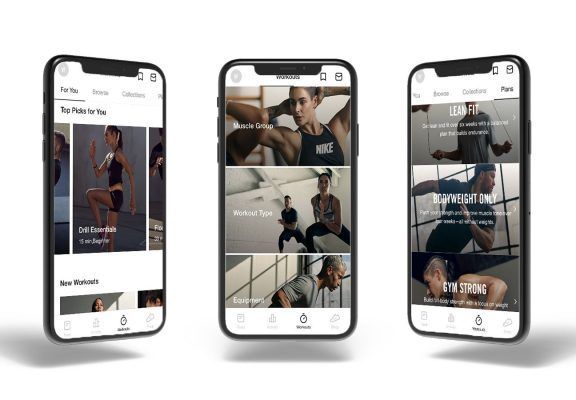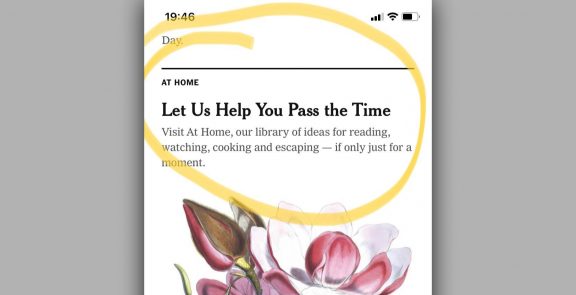

Nike App: Who knows more than a brand?
IN A NUTSHELL:
In an increasingly connected global society, and one that receives a daily proliferation of information and messages, some brands have managed to become the perfect substitutes for those specialised and formal sources of information that have today lost the credibility and trust they used to enjoy.
THE GREAT STRATEGIC TAKEOUT:
A new reality in which people expect brands to actively behave as a platform for information and “wisdom”, and which offers a favourable context for these brands to position themselves as leading reference sources on a topic as a key element to their USPs and, in so doing, capitalise on, empower and expand their business.
Why should I read this?
Institutions, politicians, traditional media and even science are increasingly exposed to investigations and social “inspections” that have diminished the almost invulnerable credibility they enjoyed some years ago.
Moreover, despite being under ever closer scrutiny from consumers, brands have the opportunity and the right context to become a source of information and contemporary wisdom that brings value to society and to their business.
What are we talking about?
Fuelled by the COVID-19 pandemic, the world is undergoing a profound demographic, political, economic and social shift. Alongside this metamorphosis, information and reference sources have also evolved exponentially, giving rise to new alternatives that diversify and change the way in which people construct their view of the world and form their opinions.
In fact, brands have taken on a vital responsibility as influencers of public opinion. Brands are directly responsible for a new reality that has captured a vital need for a society that believes less and less in those who owned the information and is based on other references.Today, information to solve problems, desires or concerns, which used to be found by turning to “experts”, can be obtained with the help of these new sources.
However, while this presents an opportunity, it is also a responsibility that calls on brands to:
- Have a very clear promise: a clear positioning, proposition and fundamentals in order to become a benchmark and destination for information in the territory that will be a key piece in its USP.
- Invest in building credible spaces (physical and digital) that streamline and amplify information about the subject in question.
- Place value on the convenience and easy access of this type of information source.
- Share knowledge through the new contemporary language: much more empathic, familiar and “human”, differentiated from the approach of traditional sources of information.
- Offer various “demand scenarios” in which different information is accessible depending on the level. The possibility of personalising access to this type of information is an essential part of the source.
- Connect the business with the content, so that what is being sold is also part of the “wisdom” offered by the brand.
In this context, Nike —through Nike Training Club and Nike Run Club— is a clear example of a brand that has been able to differentiate itself as an information destination and specialist in the world of sport; it has capitalised on all its expertise and, put simply, it is selling more than ever.
In its own words, it is a solution that gives you “the guidance, inspiration, and innovation you need to become a better athlete” and it backs this up through its sources and experts. A promise that subtly suggests that it is no longer necessary to go to a doctor or fitness trainer to find information on how to get fit, but that users can find everything they need on the app.
Its success is due to the fact that Nike offers a “personal trainer” that adapts to the users’ goals and provides them with a training plan that connects with their demands in an accessible and personalised way.
Once on the journey, the brand has found the way to connect its wisdom with its business. For example, it offers early access to new products and exclusive collections, with invitations to events and experiences designed for the club members, and a “personalised recommendations” service through which, depending on the exercise and training plan used, the brand presents the clothes and items needed to perform better and excel.
It is worth noting that there are other examples of contemporary brands that have become information destinations by boosting their business in different categories:
Apple Health, as a benchmark in health, has managed to increase the amount of time consumers spend on their mobiles sharing more and more personal data, and it has also encouraged them to download different partner applications (Mediasafe, Dexcom, Lose it!, Zova, etc.).
EasyJet, through its Traveller magazine, has become a benchmark in travel, and today it competes with traditional agencies and magazines when it comes to organising “perfect holidays” (itineraries, plans, activities, etc.).
In short, only those brands that can interpret this new context and act accordingly will become the new sources of information and contemporary wisdom and be able to capitalise on their relevance, diversify and enhance their sources of business.
Links and what to pay attention to:
- On the way that brands take on the almost “expert” role. Thanks to the credibility they have established, they can position themselves as the “perfect partner, the solution, the answer to your health” or, simply, present themselves directly as doctors.
- On how they explain and evidence their sources and shield their “prescription”. They refer to “Master Trainers, “Fitness Experts”, “Nutrition Specialists”, “Recovery and Sleep Advisors”, etc.
- On the connection and visibility of the business with the content proposition. Selling is not secondary, but it forms part of the content and the possibility to “progress” and continue to develop.
- On the way they connect with their audiences through accessible, personalised and convenient tips, challenges and proposals.
- On the tone of voice that, in contrast to traditional sources of information, connect in a more empathetic, straightforward and human way. (Information and wisdom are not synonymous with complexity or technicality)
- On the “technological language” that allows users to share their progress on social networks and to feel proud of their achievements.
WHY YOU SHOULD BE INTERESTED:
To strategically consider that the opportunity brands have to become benchmarks on a topic and be the new sources of information and contemporary wisdom is not only a very effective brand differentiator, but that it may be one of the most powerful tools for diversifying and enhancing the core of their business.
What needs does it meet?
In response to the decline in great stories and distrust of traditional sources of information, some brands are positioning themselves as contemporary information destinations, in tune with consumer expectations and desires.
From a strategic perspective:
The search for information will always be central to people’s lives and, in a world of proliferating messages, it is important for brands to distinguish themselves and find ways to become a destination that attracts new consumers, enabling them to drive and expand their business.
Who might be interested?
Any category because, as new contemporary sources of information, they transcend the business or product and connect to society as a whole. Any brand that becomes a destination will have the opportunity to enhance and differentiate its product, experience, service and content propositions.
Where do I implement it?
As the impact is transversal, connecting all areas of the business and the brand, it is essential to have a differentiated positioning that can be converted into a destination for information. Brand narratives, activations and communications must be geared to continuing to build credibility.
How do I implement it?
Through an inspiring and consumer-friendly information platform.
How innovative is it?
It is a new perspective on the possible role contemporary brands can play and the definition of their USPs. Society and consumers are changing, and the brands that differentiate themselves and enhance their business are the ones that become information destinations and thereby build credibility and relevance.
Key concepts:
credibility, consumer, positioning, proposition, communication
I WANT IT FOR MY COMPANY/BRAND. WHAT DO I NEED TO KNOW?
Who is using it already?
It is worth studying and comparing Nike, which establishes credibility through sportspeople, athletes and influencers, and Apple, which is also an information destination with contemporary language, but whose credentials are more closely linked to the traditional/medical universe.
Things to keep in mind:
- Positionings: how they are the basis of relevance and from where a brand becomes a point of reference.
- Type of information shared and objective: being an expert brand on a particular topic and expressing it as part of a communication/activation strategy is not the same as aiming to transform and become a leading source on a topic as part of the USP.
- Connection with the business: the way in which the business forms part of the content and the “wisdom”.
- Credentials and evidence that supports it: the type of sources and influencers used and the role assigned to them by each brand.
How do I get a clearer idea?
- Using the app Nike Training Club and analysing how it shares information and how it presents the “journey” to you.
- Analyzing partnerships with other brands and initiatives.
How do I share it with my network?
“Are we capitalizing on the possible contemporary role brands could have as new sources of information and wisdom? Do we know how to build a brand to be an information destination?”




